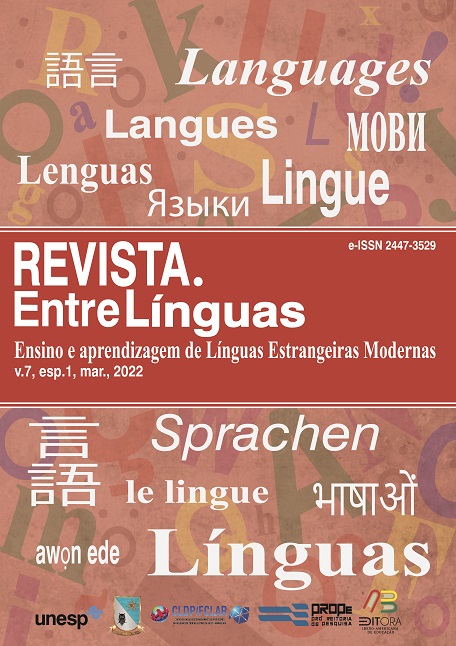Color terms and phraseological units of sports jargon
Russian and French Languages
DOI:
https://doi.org/10.29051/el.v8iesp.1.16937Keywords:
Language worldview, Sports communication, Linguoculture, Sports terms, PhraseologyAbstract
The study discusses some aspects of sports communication and linguistic worldview with due regard to national and cultural parameters. In particular, the authors of the article study sport phraseological units with coloronim-components in Russian and French. They describe various components of sports worldview in two linguistic cultures, whose key element is the linguistic personality of a common native speaker. Empirical data are analyzed and interpreted on the basis of the linguo-semiotic approach, i.e., within the framework of a discourse statement and at the level of the nominative fund of Russian and French. Sports terms are considered at the level of general linguistic and ethno-cultural dominants of national jargons. The hypothesis is that the structure of any discourse is based on the use of professional and jargon (in particular sports) terms. Their semantics correlates with the linguistic self-identification of each nation.
Downloads
References
ABBYY. ABBYY Lingvo X3 ME: Slang disctionaries. Мoscow: Lingvo, 1996-201. Available in: http://www.lingvo.ru/lingvox3/medved. Access in: 14 Oct. 2020.
AKIMOVA, E. N. Kolorativy v povesti I.S. Shmeleva "Leto Gospodne" i tsvetosemantika pravoslavnoi yazykovoi kartiny mira [Coloratives in I.S. Shmelev's "Summer of the Lord" and color semantics in the Orthodox language worldview]. Arzamas: AGPI, 2012.
BLANCHET, B.; LESAY, J. D. Le Dico du parler sport [The dictionary of sports talk]. Paris: Fetjaine, 2012.
BOBYREVA, N. N. Eponimicheskie edinitsy v terminosistemakh sportivnoi i khudozhestvennoi gimnastiki (na primere russkogo i angliiskogo yazykov) [Eponymic items in the term systems of rhythmic and artistic gymnastics (as exemplified by Russian and English)]. Voronezh: Istoki, 2012.
BOGOSLOVSKAYA, V. R. Aktivnye protsessy v sportivnoi terminologii sovremennogo russkogo yazyka [Active processes in sports terms of modern Russian]. Saint Petersburg: St. Petersburg State University Publishing House, 2002.
CHUDINOV, A. P. Sportivnaya metafora v sovremennom rossiiskom politicheskom diskurse [Sports metaphors in the political discourse of modern Russia]. Vestnik Samarskogo Gosudarstvennogo Universiteta, Seriya "Lingvistika i Mezhkulturnaya Kommunikatsiya", v. 2, p. 26-31, 2001. Available in: http://www.vestnik.vsu.ru/pdf/lingvo/2001/02/chudinov.pdf. Access in/: 14 June 2021.
ELISTRATOV, A. A. Imennaya neterminologicheskaya leksika sporta [The noun and non-term vocabulary of sports]. Vestnik Chelyabinskogo gosudarstvennogo universiteta, v. 34, n. 172, Filologiya. Iskusstvovedenie, n. 36, p. 26-32, 2009.
FILIPPOVA, E. I. Territoriya kollektivnoi identichnosti v sovremennom frantsuzskom diskurse [The scope of collective identity in the modern French discourse]. Moscow: Russian Academy of Sciences, 2010.
KOZHEVNIKOVA, I. G. Russkaya sportivnaya leksika: Strukturno-semanticheskoe opisanie [The Russian sports vocabulary: Sstructural and semantic description] Voronezh: Izd-vo Voronezh. gos. un-ta, 2002.
LIGAS, P. Registres, stéréotypes et charge culturelle des mots dans le discours sportif non normatif [Registers, stereotypes, and cultural weight of words in non-normative sports discourse]. Éla. Études de linguistique appliquée, v. 165, n. 1, p. 13-27, 2012. Available in: https://www.cairn.info/revue-ela-2012-1-page-13.htm. Access in: 14 Jan. 2021.
MAHAL, I. Aktivnye protsessy v sportivnoi terminologii sovremennogo russkogo yazyka [Active processes in sports terms of modern Russian]. Brno: Masaryk University, 2008.
MALYSHEVA, E. G. Sistema kontseptualnykh dominant russkogo sportivnogo diskursivnogo prostranstva [The system of conceptual dominants of the Russian sports discourse]. Yazyk. Tekst. Diskurs: Nauchnyi almanakh Stavropolskogo otdeleniya RALK, n. 9, p. 114-121, 2011.
MERLE, P. Le foot comme on le cause [Football as we mean it]. Paris: Hors collection, 2001.
MOUSSET, E. Мétaphore sportive. Profstory, 2010. Available in: http://profstory.blogspot.ru/2010/01/une-metaphore-sportive.html. Access in: 15 Mar. 2021.
NIKITINA, K. A. Professional sports phraseology: Classification by origin. Moscow: Young scientist, 2013.
Otkuda poshlo vyrazheniye "Sud'yu na mylo"? [Where did the expression "turn the referee into soap" come from?]. Otvety, 2008. Available in: https://otvet.mail.ru/question/8179015. Access in: 14 Jan. 2021.
PRUVOST, J.; SEDYKH, A. P.; BUZINOVA, L. M. Tekst, kontekst, intertekst: Sintez smysloporozhdenija [Text, context, intertext: Synthesis of the generation of meaning]. Nauchnyj rezultat. Voprosy teoreticheskoj i prikladnoj lingvistiki [Scientific Result. Theoretical and Applied Linguistics], v. 4, n. 3, p. 21-35, 2018. Available in: https://cyberleninka.ru/article/n/tekst-kontekst-intertekst-sintez-smysloporozhdeniya/viewer. Access in: 15 Jan. 2021.
RIVELINO, R. Ot finta. 7 effektnykh i praktichnykh obmannykh dvizheniy [From the feint. 7 spectacular and practical deceptive moves]. Mar. 27, 2013. Available in: http://www.sports.ru/tribuna/blogs/footballweekly/440254.html. Access in: 14 Jan. 2021.
SEDYKH, A. P. et al. Universal and national cultural features of the naming in sports. Revista Turismo Estudos & Práticas, n. S3, p. 61, 2020.
SEDYKH, A. P.; MARABINI, A. Frazeologija i perevod: Francuzskij, ital'janskij i russkij jazyki. Uchebno-metodicheskoe posobie [Phraseology and translation: French, Italian and Russian. Study guide]. Belgorod: Epitsentr, 2021. 252 p.
SHAMONAEV, O. Yazyk sporta. Bestolkovyy slovar'-9 [The language of sports. Clueless dictionary-9]. Mar. 20, 2013. Available in: http://helghelg2.livejournal.com/10433.html. Access in: 14 Jan. 2021.
SPEAK-SPORT. Glossaire sport-français, 2022. Available in: http://speaksport.free.fr. Access in: 20 Jan. 2022.
ZILBERT, A. B. Sportivnyi diskurs: Tochki peresecheniya s drugimi diskursami (problemy intertekstualnosti) [Sports discourse: Intersection with other discourses (intertextuality issues)]. In: KRASNYKH, V. V.; IZOTOV, A. I. (Eds.). Yazyk soznanie kommunikatsiya: Collection of articles. Moscow: MAKS Press, 2001. n. 19, p. 103-112.
Published
How to Cite
Issue
Section
License

This work is licensed under a Creative Commons Attribution-NonCommercial-ShareAlike 4.0 International License.
Os manuscritos aceitos e publicados são de propriedade da Revista EntreLínguas. Os artigos publicados e as referências citadas na Revista EntreLínguas são de inteira responsabilidade de seus autores.
Transferência de direitos autorais – autorização para publicação
Caso o artigo submetido seja aprovado para publicação, já fica acordado que o(s) autor(es) autoriza(m) a UNESP a reproduzi-lo e publicá-lo na EntreLínguas, entendendo-se os termos “reprodução” e “publicação” conforme definição respectivamente dos incisos VI e I do artigo 5° da Lei 9610/98. O artigo poderá ser acessado pela rede mundial de computadores (Internet), sendo permitidas, a título gratuito, a consulta e a reprodução de exemplar do artigo para uso próprio de quem a consulta, desde que haja a citação ao texto consultado. Essa autorização de publicação 328 EntreLínguas, Araraquara, v. 1, n .2, p. 323-328, jul./dez. 2015 não tem limitação de tempo, ficando a UNESP responsável pela manutenção da identificação do(s) autor(es) do artigo. Os artigos publicados e as referências citadas na Revista EntreLínguas são de inteira responsabilidade de seus autores.











